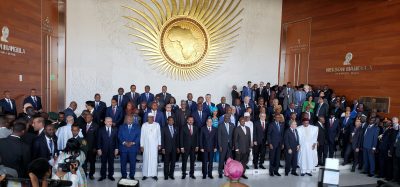The newly elected Chairperson of the African Union, Cyril Ramaphosa, also President of South Africa, has accused foreign powers for fuelling the continued conflicts on the African continent.
This was in his first address to the African Union Heads of State and Government during the 33rd Ordinary Session of the Assembly taking place in Addis Ababa, Ethiopia from 9-10 February 2020.
Ramaphosa outlined his priorities of focus being: peace, gender equality, inclusive growth and development.
“External influences have a perilous agenda for Africa…countries outside our continent are fighting proxy wars that are fuelling ongoing conflicts on our continent,” he said before associating himself with the plight of the Palestinian people in their quest for sovereignty.
 Ramaphosa said that Africa should realise that there is no military solution to the problems in Africa but the solution is with Africa taking charge of its agenda and devising African solutions to African problems.
Ramaphosa said that Africa should realise that there is no military solution to the problems in Africa but the solution is with Africa taking charge of its agenda and devising African solutions to African problems.
Making reference to the African Union’s theme for the year 2020: “Silencing the Guns: Creating conducive conditions for Africa’s development”, Ramaphosa noted that Africa has pursued peace building and consultation.
He said in Somalia, AMISON continues to deploy. He recognised the contribution of African nations to peace keeping efforts and the sacrifices they are making to pacify the continent.
Silencing the guns is a pledge to achieve the aspirations of Agenda 2063, which envisions a peaceful and secure Africa.
Ramaphosa said that economic and financial inclusion of women and the drive to position Africa as a strong world player, is top on his agenda.
“We have to find more practical and sustainable ways of empowering the women of our continent,” he said adding that “public and private procurements offer great opportunities as they account for 30% of the GDP of many countries on the continent.”
He noted that Agenda 2063 calls for the allocation of at least 25 per cent of public procurement to be for women-owned businesses but that the reality shows women owned-businesses are given less than 1% of procurement.
“We have to change this. It is not unreasonable to advocate for preferential public procurement legislation to advantage women-owned businesses, and for the establishment of preferential trade and customs regimes for women,” he added.




